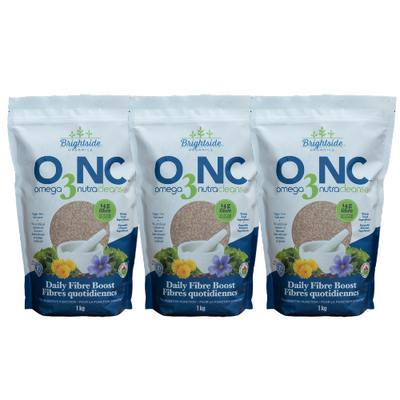Five Signs You’re Not Getting Enough Fibre
You probably don’t give much thought to how much fibre you’re getting in a day. Even when following conventional health advice like drinking plenty of water, getting regular exercise, and eating at least five servings of fruits and vegetables daily, counting fibre grams is not part of most people’s daily routine.
A new study shows that only about ten percent of people are eating enough fibre. How do you know if you’re one of the 90 percent who doesn’t? Here are five signs you’re not getting enough fibre in your diet:
You’ve been diagnosed with a chronic illness.
While there are many contributing factors to chronic diseases like diabetes and cardiovascular disease, one big factor is gut health. The best way to ensure gut health is with a diversity of good bacteria in your digestive tract and those good bugs need to be fed to make sure they stick around and multiply.
Fibre is not digested by the body and when it reaches your intestines more-or-less intact, it provides food for that helpful gut bacteria. A healthy microbiome reduces inflammation which, in turn, helps you avoid disease.
You suffer from brain fog.
You’re under a deadline but no matter how many cups of coffee you drink or brisk walks you take, you can’t clear your head enough to do your best work on that very important project or study for that very important test. Inflammation, which we already know can be tamped down by a healthy microbiome, affects your ability to focus.
Toxins can also play a major role in brain health. Your body is set up with tools to rid itself of waste products and one of those tools is fibre. Fibre can sweep away the toxins before they are reabsorbed by your body to keep your brain operating in optimal condition.
You’re hungry all.the.time.
Are you familiar with this scenario? You eat a meal and feel comfortably full when you’re done but an hour later you’re poking around in the kitchen looking for something to snack on. Fibre can help in a few different ways.
There are studies that indicate that fibre helps to regulate hormones such as ghrelin and leptin, which control appetite and feelings of satiety. Fibre also slows down how fast your stomach empties after a meal. It controls the speed with which glucose is released so you avoid the sugar roller coaster which often stimulates the need to eat. Fibre, along with a healthy amount of fat, is the key to staying full and feeling satisfied until mealtime rolls around again.
Your mood is all over the place.
The gut is sometimes referred to as the second brain. That’s because neurotransmitters like serotonin are manufactured in your intestines, and the amount of serotonin in your bloodstream directly affects your mood. Imbalances between good and bad gut bacteria affect your body’s ability to produce adequate amounts of the neurotransmitters you need to balance your mood.
You are constipated.
You knew it was coming. You can’t have a discussion about fibre without mentioning what’s going on in the bathroom. If you spend way more time looking for good bathroom reading material than you would like, you’re almost certainly not getting enough fibre.
Both types of fibre come into play here: insoluble fibre adds bulk to your stool so that it moves through your digestive tract more quickly leading to more frequent bowel movements. As mentioned above, this is important because less time in transit means less time for your body to reabsorb the toxins it’s trying to get rid of. Soluble fibre retains the water in your stool, making it softer and easier to pass. Adequate fibre intake, along with drinking enough water, is key for healthy bowel movements and quick-and-easy bathroom trips.
Fibre is a wellness superstar that helps keep your body healthy from top to bottom (pun intended!) so if you are experiencing any of the symptoms above, increase your fibre intake and watch for improvements.


